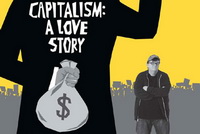Michael Moore's "Capitalism: A Love Story" to Hit Theatres
Michael Moore certainly knows how to pick his subjects. "Fahrenheit 9/11" was so au courant about the invasion of Iraq. It won the 2004 Palme d'Or at Cannes, and 2007's "Sicko" got the jump on the current healthcare imbroglio. Now "Capitalism: A Love Story" examines, in typical love-it-or-leave-it Moore fashion, the causes of the collapse of the century.

"Capitalism" is not just Moore's latest documentary, it is, as the filmmaker himself has said, "the movie I've been making for the past 20 years." He lays the ills of American society that he's chronicled over all that time at the feet of an out-of-control free-market system he so detests that he puts priests on camera to talk about capitalism as morally evil.
Clearly, Moore has not lost his provocateur's gift for stirring the pot, and it is heartening to have a filmmaker take on a subject this all-encompassing and almost taboo. But not even Moore's skill can quell the suspicion that "Capitalism" misses the narrower focus that gave his earlier films some of their punch.
In a sense, "Capitalism" comes by its wide-ranging, scattershot approach naturally. After all, this is a heck of a big subject: Just ask Karl Marx, who spent 18 years researching and writing his multi-volume "Das Kapital." So it's perhaps inevitable because of the ton of territory "Capitalism" covers that this film ends up as the sum of its parts, nothing more, Los Angeles Times reports.
It was also reported, Moore is funniest when manipulating stock footage to sugarcoat his more academic points: Here, the credits are followed by clips from a Britannica Films production about the decadent decline of the Roman Empire, intercut with recent footage that fits right in. But before long we are forced to watch families in the Midwest being evicted from their homes, ruined by having fallen for deceptive mortgage practices.
Even though the trailer emphasizes Moore as "star" -- showing him talking to members of Congress and trying to gain access to the AIG building in order to make a citizen's arrest of its chief executive -- he is not aggressively (or egotistically) on screen much more than he was in "Fahrenheit 9/11." In fact, when he does get personal, it's in a decidedly heartfelt, non-wiseacre mode. We see pre-adolescent Mike in home movies as he gives a few details about the notion of the American Dream that he was raised on. And, quite touchingly, he takes a walk with his very old dad, past the site of the demolished factory where the latter worked for 30 years, Los Angeles Times reports.
Moore says the film gets to the core of what he's been trying to say throughout his career.
"I've done this for 20 years, and I'm tired of dancing around it," he said. "You know, make a movie about General Motors here, make a movie about the health care industry there. These are all spokes to the hub. And that hub is capitalism."
"[It's] an economic system that's ... protecting, and guaranteeing the richest 1 percent, so that they have as much financial wealth as the bottom 95 percent combined ...In a democracy, how can you have that?" Moore said. "How can you have the richest 1 percent really calling the shots like that?" ABC News reports.
Subscribe to Pravda.Ru Telegram channel, Facebook, RSS!




